Completed evaluations
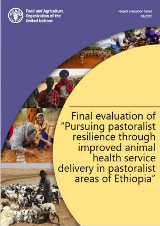
Final evaluation of "Pursuing pastoralist resilience through improved animal health service delivery in pastoralist areas of Ethiopia"
08/04/2020
This project implemented by FAO between 2014 and 2020, was designed to support the Government of Ethiopia in strengthening the surveillance system for most Transboundary animal diseases (TADs). The project had a primary focus to implement a progressive control programme for Peste des Petits Ruminants (PPR).
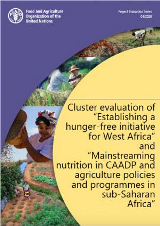
Cluster evaluation of “Establishing a hunger-free initiative for West Africa” and “Mainstreaming nutrition in CAADP and agriculture policies and programmes in sub-Saharan Africa”
08/04/2020
Challenges integrating nutrition and the elimination of hunger in agricultural programmes persist, especially in West Africa. Difficulties lie in the lack of overall understanding of the links between agriculture, nutrition and food security, in countries’ institutional capacity to concretize agriculture nutrition linkages, minimal coordination amongst key actors, as well as the existence of the necessary enabling environment to support nutrition-sensitive agricultural policies.
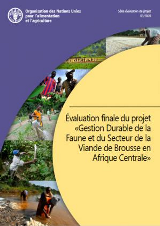
Final evaluation of the project "Sustainable Management of Wildlife and the Bushmeat Sector in Central Africa"
07/04/2020
In a context where a wildlife conservation approach has predominated so far, the project "Sustainable management of wildlife and the bushmeat sector in Central Africa" seeks to demonstrate that participatory wildlife management can be a viable strategy for conserving the functions, integrity and biodiversity of the forest ecosystem, as well...
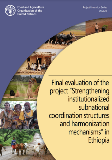
Final evaluation of “Strengthening institutionalized subnational coordination structures and harmonization mechanisms” in Ethiopia
05/04/2020
The project, implemented by FAO between 2015 and 2019, aimed to support and reinforce existing coordination mechanisms at the regional states and zonal administration levels and enhance linkages between short-term humanitarian interventions and long term development initiatives.
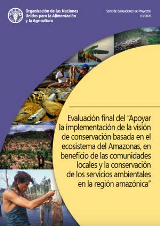
Final evaluation of "Support to the implementation of the Amazon ecosystem-based conservation vision to the benefit of local communities and the preservation of ecosystem services in the Amazon region"
01/04/2020
To support the community of park directors of the protected areas of the Amazon (REDPARQUES) and to guarantee the effective and collaborative protection of these areas, between 2014 and 2019, FAO implemented the project 'Integration of the Protected Areas of the Amazon Biome' (IAPA).
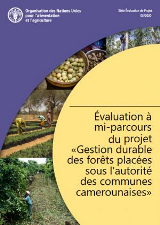
Mid-term evaluation of the project “Sustainable forest management under the authority of Cameroonian councils”
30/03/2020
The main objective of the project "Sustainable forest management under the authority of Cameroonian councils" is to reduce deforestation and forest degradation in council forests in order to improve biodiversity conservation, reduce emissions and enhance carbon stocks, and improve livelihoods of local communities. (French only)

Africa Region Synthesis of Evaluations 2014-2019
23/03/2020
This paper documents FAO’s contribution to results, identifies gaps and emerging issues, and lessons learned. The synthesis is organized around three themes, namely, food security and nutrition (ending hunger), building resilience to threats and crises, and the sustainable management of natural resources.
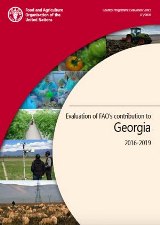
Evaluation of FAO’s contribution to Georgia 2016-2019
20/03/2020
The purpose of the Georgia Country Programme Evaluation (CPE) is to provide feedback that will better orient FAO’s programme and boost the impact and resonance of the next Country Programming Framework (CPF). It seeks to contribute to learning at corporate, regional and country level by drawing lessons and making recommendations to steer FAO’s engagement there. It will also enrich FAO’s synthesis of findings and guidance for country-level support.

Report of the Synthesis of past evaluations in the Near East and North Africa (NENA) region
02/03/2020
This synthesis of evaluations completed between 2014 and 2019 of FAO projects and programmes in the Near East and North Africa (NENA) region aim to inform the FAO Regional Conference for the Near East (NERC) on the results, issues and lessons learned from OED evaluations.
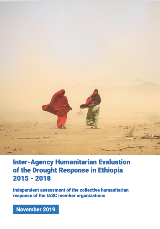
Inter-Agency Humanitarian Evaluation of the drought response in Ethiopia
02/03/2020
Droughts in Ethiopia have affected millions of people between 2015 and 2018, triggering a large-scale humanitarian response from the international community. Ethiopia was selected as the focus of the Inter-Agency Humanitarian Evaluations (IAHE), because of the large-scale humanitarian contribution to the government-led response to successive droughts in the country since 2015.
